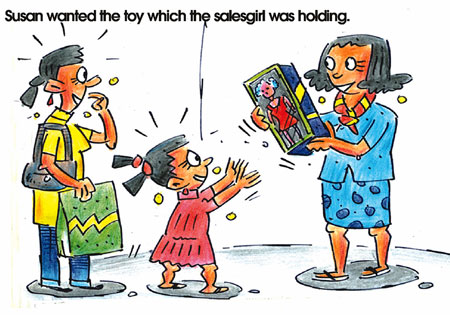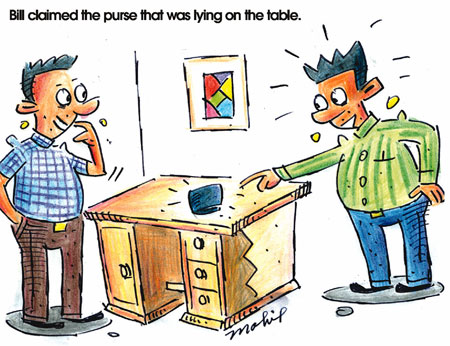|

by R. S. Karunaratne
Sentence structure
[Part 2]
Apart from joining sentences with ‘and, but’ or ‘or’ we can join two
sentences by turning one into a main clause and the other into a
subordinate clause. You will note that each clause will have a subject
and a finite verb.
Jane is a good speaker.
She has won many awards.
Jane is a good speaker who has won many awards.

Brian is a good swimmer.
He won a gold medal.
Brian is a good swimmer who won a gold medal.
Lakdas is a successful businessman.
He spends lavishly on religious activities.
Lakdas is a successful businessman who spends lavishly on religious
activities.
Lazarus was a hard-working journalist.
He died a few years ago.
Lazarus was a hard-working journalist who died a few years ago.
Shyam is a young novelist.
He won the Literary Award for his latest novel.
Shyam is a young novelist who won the Literary Award for his latest
novel.
In the above sentences we used ‘who’, a relative pronoun, to join two
sentences. We use ‘who’ only for a person or people. It can be used with
singular or plural nouns.
We use the relative pronoun ‘which’ to describe all nouns except
people.
We have to eat nutritious food.
It keeps us healthy.
We have to eat nutritious food which keeps us healthy.
The police are looking for the car.
It was used in the robbery.
The police are looking for the car which was used in the robbery.
The student asked questions one after the other.
It irritated the lecturer.
The student asked questions one after the other which irritated the
lecturer.
Did you see my pen?
It was a birthday gift.
Did you see my pen which was a birthday gift?
Susan wanted the toy.
The salesgirl was holding it.
Susan wanted the toy which the salesgirl was holding.
Jothi sang a song.
It became popular overnight.
Jothi sang a song which became popular overnight.
We can join two sentences using the relative pronoun ‘that’. It
describes all nouns including people.
I am watching a bird.

It is flying towards Sri Pada.
I am watching a bird that is flying towards Sri Pada.
Himali is a gymnast.
She is going abroad to participate in a contest.
Himali is a gymnast that is going abroad to participate in a contest.
The police have found the car.
It was stolen last night.
The police have found the car that was stolen last night.
Max is a retired professor.
He is going to deliver a lecture.
Max is a retired professor that is going to deliver a lecture.
I know a few students.
They collect old coins.
I know a few students that collect old coins.
Bill claimed the purse.
It was lying on the table.
Bill claimed the purse that was lying on the table.
[Activity]
Join the following sentences using ‘who, which” or ‘that’. Check your
answers with the key.
1. Those are the politicians.
They are always against progressive measures.
.................................................
2. We work in a company.
It publishes newspapers.
.................................................
3. I saw the police dogs.
They helped to catch the robber.
.................................................
4. The first prize went to Amanda.
She had written the best essay on tsunami.
................................................
5. Gwen is reading some poems.
They were written by Byron.
................................................
6. Why are you looking at her?
She is not very attractive.
................................................
7. I spoke to the technician.
He was repairing my watch.
................................................
8. He is a well-known African king.
He has 13 wives!
................................................
9. Can you call that driver?
He seems to be a good person.
.................................................
10. I am a member of the Toastmasters’ Club.
It is an international organisation.
.................................................
[Key]
1. Those are the politicians who are always against progressive
measures.
2. We work in a company which publishes newspapers.
3. I saw the police dogs which helped to catch the robbers.
4. The first prize went to Amanda who had written the best essay on
tsunami.
5. Gwen is reading some poems which were written by Byron.
6. Why are you looking at her who is not very attractive?
7. I spoke to the technician who was repairing my watch.
8. He is a well-known African king who has 13 wives!
9. Can you call that driver who seems to be a good person?
10. I am a member of the Toastmasters’ Club which is an international
organisation.
Test your language skills
Do the following Word Power Test in 15 minutes and check your answers
with the key.
Score chart: All correct : Excellent
Between 15 and 19: Very good
Between 10 and 14: Good
Below 10 : Poor
Underline the meaning of the words in bold type.
1. abashed:
(a) embarrassed
(b) memorable
(c) funny
2. abate
(a) to become less strong
(b) to become stronger
(c) to become shy
3. abattoir
(a) a woman who is in charge of a convent
(b) a building where monks live
(c) a place where animals are killed for their meat
4. abbot
(a) the lower part of a man’s body
(b) a man in charge of a monastery
(c) a feeling of hate
5. abhorrent
(a) morally very bad
(b) extremely unhappy
(c) burning very strongly
6. ablution
(a) the place where somebody lives
(b) something abnormal
(c) the act of washing yourself
7. abominable
(a) sudden or or unexpected
(b) very bad or unpleasant
(c) very great
8. absolve
(a) to take something in
(b) to free somebody from guilt
(c) not to do something
9. abstemious
(a) not doing things which give you pleasure
(b) not paying attention to what is happening
(c) stupid or unreasonable
10. abundant
(a) filled with noise
(b) more than enough
(c) very bad
11. accessible
(a) willing to help others
(b) happening by chance
(c) able to be reached
12. accomplice
(a) one who helps somebody else to commit a crime
(b) something that is successful
(c) a formal agreement
13. accoutrements
(a) an amount that has been collected
(b) gradual increase or growth
(c) equipment needed for a particular activity or way of life
14. accursed
(a) familiar with something
(b) very annoying
(c) being familiar with a person
15. acquisitive
(a) eager to own and collect things
(b) full of anger
(c) able to perform difficult tasks
16. activate
(a) to change the format
(b) to suffer
(c) to cause something to start
17. addendum
(a) a type of poisonous snake
(b) something added to a book
(c) the process of adding
18. adept
(a) very near
(b) satisfying for a particular purpose
(c) having a natural ability to do something that needs skill
19. admonition
(a) a warning
(b) a mixture of earth and straw
(c) very strong love
20. adulation
(a) the arrival of an event
(b) very great admiration
(c) the development of something
[Key]
1. (a), 2. (a), 3. (c), 4. (b), 5. (a), 6. (c), 7. (b), 8. (b), 9.
(a), 10. (b), 11. (c), 12. (a), 13. (c), 14. (b), 15. (a), 16. (c), 17.
(b), 18. (c), 19. (a), 20. (b)
Starters:
More on indefinite pronouns
‘Somebody, someone, anybody, anyone’ are some of the indefinite
pronouns used in English. There is no significant difference between
‘somebody’ and ‘someone’ or ‘anybody’ and ‘anyone’. Similarly, there is
no difference between ‘everybody’ and ‘everyone’ or ‘nobody’ and ‘no
one’. However, unlike other nouns, ‘no body’ is written as two words.
Note that ‘ no one, anyone, everyone, someone’, and ‘anyone’ are more
common in writing. ‘Nobody, everybody, anybody, somebody’ and ‘anybody’
are more frequent in speech.
‘Somebody’ or ‘someone’ is a person not known to us.

There is somebody at the door.
There is someone in the toilet.
There is somebody in the garden.
Someone has broken the window.
Somebody has taken my dictionary.
‘Anybody’ and ‘anyone’ are used in questions and negatives.
Is there anybody in the bathroom?
There isn’t anyone in the bathroom.
Can anyone become an engineer?
She hasn’t spoken to anyone about this matter.
I haven’t told anybody that you are leaving school.
Was there anyone you knew at the conference?
Has anybody seen my glasses anywhere?
Anyone can join the Toastmasters’ Club.
Note: ‘Anybody, anyone, someone’ or ‘somebody’ are usually followed
by ‘they’.
If anyone wants to leave the class, they can do so now.
A: There’s someone at the door.
B: Tell them I’m busy.
Somebody has left their umbrella on the bus.
Although ‘anyone’ and ‘anybody’ mean a single person, ‘any one’,
written as two words, means ‘any single person or thing.’
You can borrow any one book at a time.
A similar difference exists between ‘everyone’ and ‘every one.’
There aren’t any mangoes left. They have eaten every one.
‘Somebody’ or ‘someone’ can be followed by adjectives or adverbial
expressions.
I hope you will meet somebody nice when you go to Canada.
I am going to meet someone in the Ministry of Education.
Everybody / Everyone
There is no difference between the two words. However, ‘everybody’ is
more frequent in speech while ‘everyone’ is more common in writing. Both
words mean ‘every person.’ They are used with a singular verb.
Everyone wishes to attend tomorrow’s meeting.
Everybody has their own views on educational reforms.
Everyone has responded except John.
Do you think that everybody should learn English?
Everybody knows who the culprits are.
Everyone involved in the robbery has been questioned by the police.
Goodbye everybody, I’ll see you next week.
When we write ‘every one’ or ‘every body’ as two words, we refer to
people as separate members of a group. But this is not very common.
He introduced me to every one of his friends.
[Activity]
Fill in the blanks with ‘somebody, anybody’, or ‘everybody’. Check
your answers with the key.
1. There’s ................... in the laboratory.
2. ................. knows how to do this.
3. There isn’t .................... in the library.
4. ....................... is happy when they pass the examination.
5. ....................... is demanding a ransom from Rex.
6. We know ...................... working at the factory.
7. Do you know ........................ who can repair my sewing
machine?
8. ......................will have to pay compensation for the injured
man.
9. There isn’t ......................... who can drive a car.
10. Today ......................... in office is idling.
[Key]
1. somebody,
2. Everybody,
3. anybody,
4. Everybody,
5. Somebody,
6. everybody,
7. anybody,
8. Somebody,
9. anybody,
10 everybody.
Irregular verbs
Here are some more irregular verbs that have different forms in the
past tense and the past participle.
In the following quiz you have to fill in the blanks with the past
tense and the past participle. Check your answers with the key.
[Present tense] [Past tense] [Past participle]
1. overcome ............ ...............
2. overdo ............ ...............
3. overhang ............ ...............
4. overhear ............ ...............
5. override ............ ...............
6. overrun ............ ...............
7. oversee ............ ...............
8. oversleep ............ ...............
9. overtake ............ ...............
10. overthrow ............ ...............
11. pay ............ ...............
12. plead ............ ...............
13. prove ............ ...............
14. put ............ ...............
15. quit ............ ...............
16. read ............ ...............
17. rebuild ............ ...............
18. repay ............ ...............
19. rethink ............ ...............
20. rewind ............ ...............
21. rewrite ............ ...............
22. rid ............ ...............
23. ride ............ ...............
24. ring ............ ...............
25. rise ............ ...............
26. run ............ ...............
27. saw ............ ...............
28. say ............ ...............
29. see ............ ...............
30. seek ............ ...............
31. sell ............ ...............
32. send ............ ...............
33. set ............ ...............
34. sew ............ ...............
35. shake ............ ...............
36. shear ............ ...............
37. shed ............ ...............
38. shine ............ ...............
39. shoot ............. ................
40. show ............. ................
[Key]
1. overcame, overcome, 2. overdid, overdone, 3. overhung, overhung,
4. overheard, overheard, 5. overrode, overridden 6. overran, overrun, 7.
oversaw, overseen, 8. overslept, overslept, 9. overtook, overtaken, 10.
overthrew, overthrown, 11. paid, paid, 12. pleaded, pleaded, 13. proved,
proved, 14. put, put 15. quit, quit, 16. read, read, 17. rebuilt,
rebuilt, 18. repaid, repaid 19. rethought, rethought 20. rewound,
rewound 21. rewrote, rewritten 22. rid, rid 23. rode, ridden 24. rang,
rung 25. rose, risen 26. ran, run 27. sawed, sawn 28. said, said 29.
saw, seen 30. sought, sought 31. sold, sold 32. sent, sent 33. set, set
34. sewed, sewn / sewed 35. shook, shaken 36. sheared, sheared / shorn
37. shed, shed 38. shone, shone 39. shot, shot 40. showed, showed /
shown |


